Key takeaways
- Spinoza redefines ethics as a path to emotional peace through knowledge, rather than a set of moral rules.
- Key concepts like substance and conatus emphasize the interconnectedness of existence and the innate drive for self-preservation.
- Engagement with ethical dilemmas enhances philosophical education, making it relevant and applicable to real-life challenges.
- Applying Spinoza’s ideas fosters a growth mindset in learning, viewing challenges as opportunities for understanding and emotional clarity.
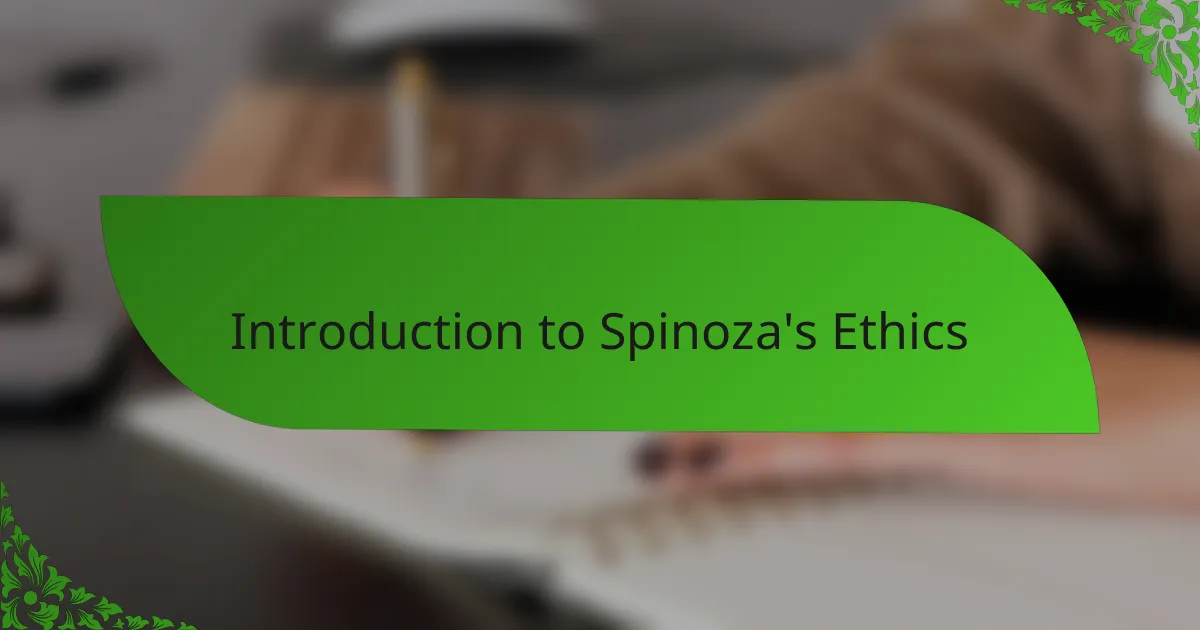
Introduction to Spinoza’s Ethics
Spinoza’s Ethics felt like stepping into a new world for me—a world where philosophy and mathematics merge seamlessly. I remember grappling with its precise geometric method, which at first seemed rigid but soon revealed a unique clarity in understanding human nature.
Have you ever wondered if there’s a way to find true happiness through reason alone? That question kept pulling me deeper into Spinoza’s work, as he argued that understanding the necessities of nature leads to freedom rather than constraint.
What struck me most was how Spinoza redefined ethics—not as a set of moral rules, but as a path to emotional peace through knowledge. This approach challenged my own assumptions and invited me to rethink what it means to live well.
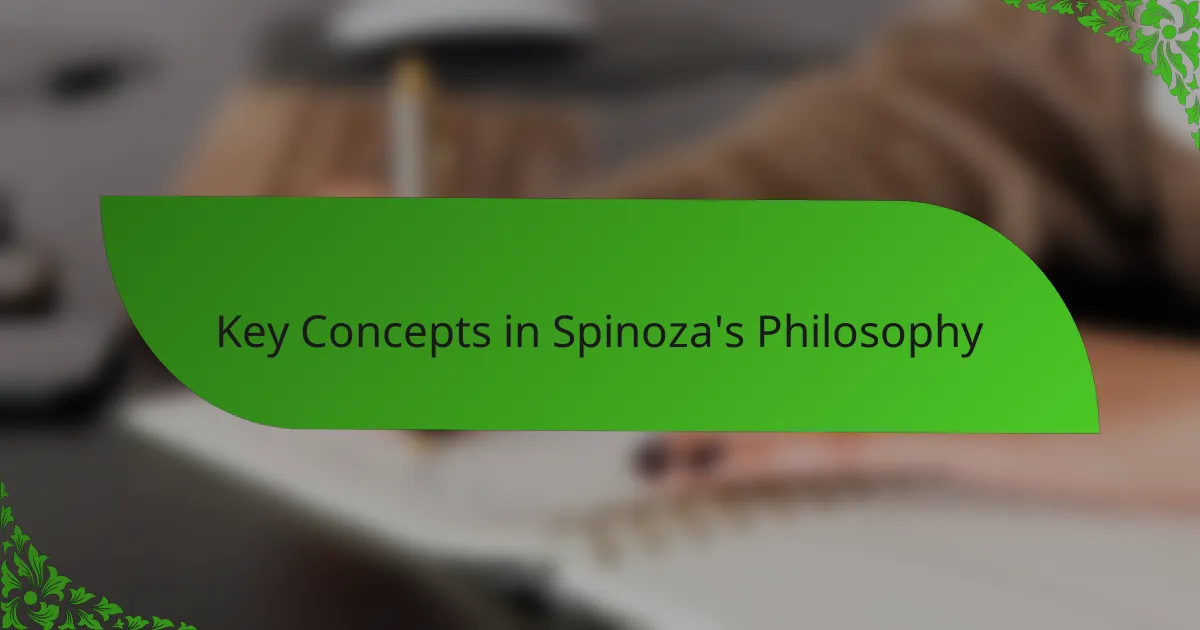
Key Concepts in Spinoza’s Philosophy
Spinoza’s concept of substance truly fascinated me—it’s this idea that there’s only one ultimate reality, which he calls God or Nature. At first, I struggled to grasp how everything, including us, could just be part of this single, infinite substance, but then it clicked: nothing exists outside this unity, and that insight shifted how I saw the world’s interconnectedness.
Another idea that really caught my attention was his notion of conatus—the innate drive in every being to persevere in its existence. It made me reflect on my daily motivations, realizing that our desires and efforts are natural expressions of this fundamental striving, rather than random whims.
And then there’s Spinoza’s view of emotions, not as obstacles, but as states we can understand and transform through reason. I often asked myself, “Can I truly master my feelings by changing how I think about them?” His answer felt empowering—knowledge isn’t just intellectual; it’s the key to emotional freedom.
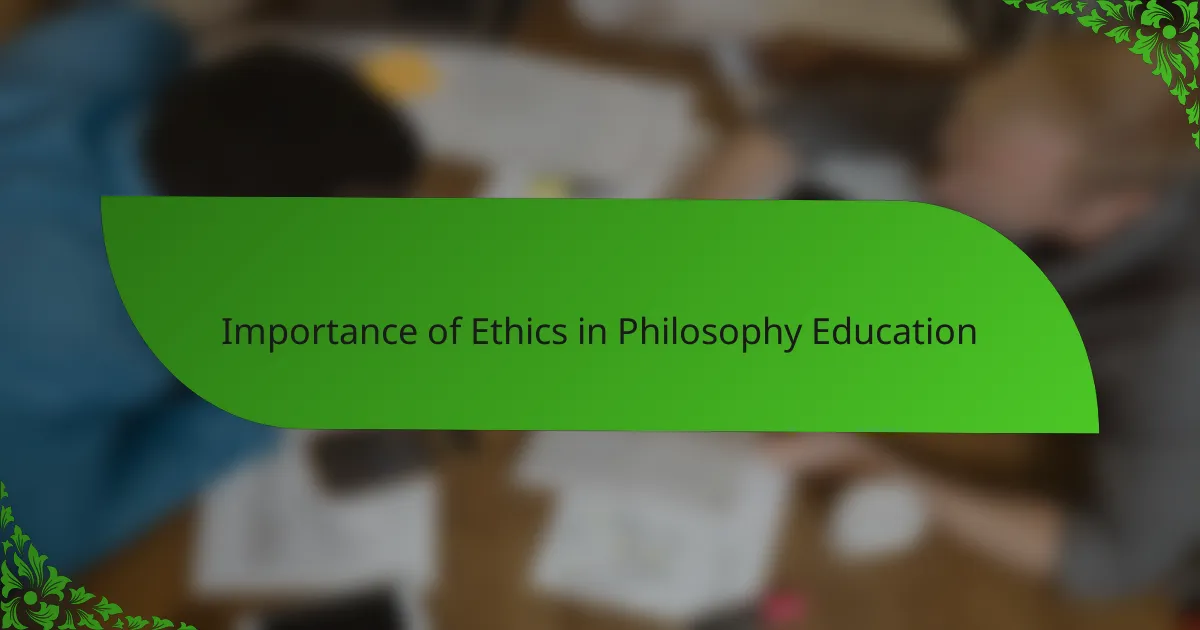
Importance of Ethics in Philosophy Education
Ethics often feels like the heartbeat of philosophy education to me. Without it, philosophy risks becoming abstract and disconnected from real life. I’ve noticed that when students engage deeply with ethical questions, their thinking sharpens, and suddenly, philosophy becomes a tool for grappling with everyday challenges.
Have you ever paused to consider why ethics holds such a vital place in learning philosophy? From my experience, it’s because ethics pushes us to examine our values and choices, encouraging a more reflective and responsible way of living. It’s not just about right or wrong but about understanding what it means to live well.
What I find most compelling is how ethics bridges theory and practice. During discussions, I often see how ethical dilemmas spark personal reflection, making philosophy feel immediate and relevant. This connection fuels a genuine curiosity that transforms philosophy education from a passive study into an active, life-changing journey.
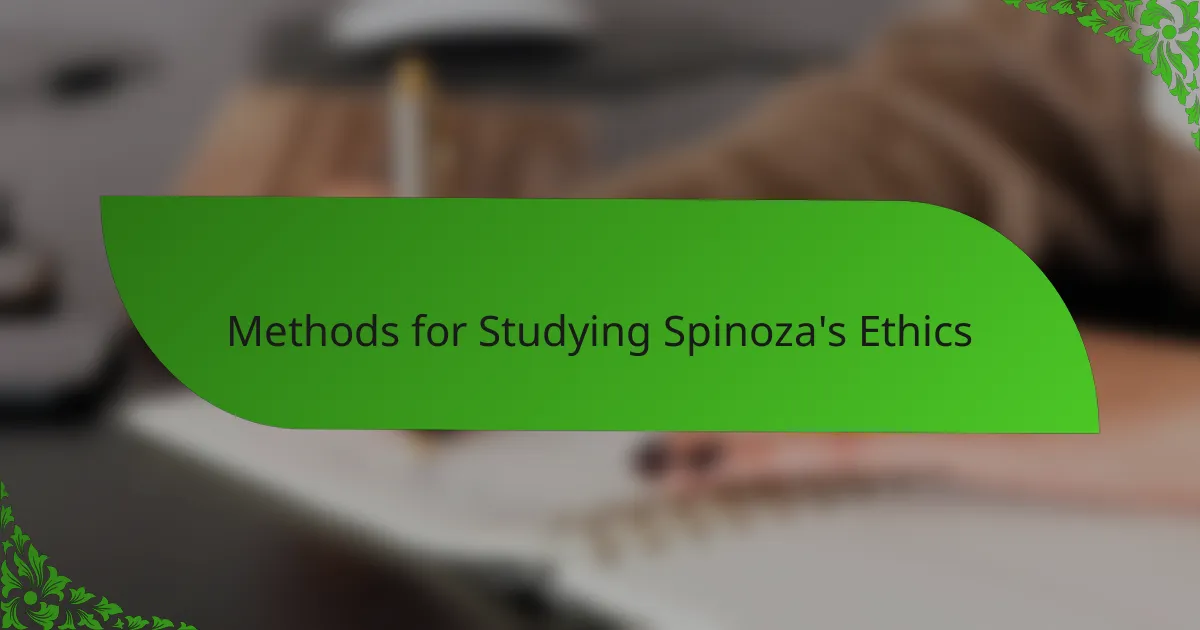
Methods for Studying Spinoza’s Ethics
When I first tackled Spinoza’s Ethics, I found that reading it alongside secondary commentaries helped me untangle his dense arguments. Have you ever tried to follow a geometric proof without a guide? That’s how I felt until I realized commentaries could act as friendly companions, breaking down each step.
Taking notes felt essential too. I would write down each proposition, then pause to reflect on what it meant for my own experience. This slowed me down in a good way, allowing the abstract ideas to settle and feel more alive.
Sometimes, I also revisited Spinoza’s Ethics by discussing it with others. Hearing different perspectives challenged my interpretations and deepened my understanding. Isn’t philosophy at its best when it becomes a shared journey rather than a solitary climb? For me, this method brought Spinoza’s complex world a little closer.
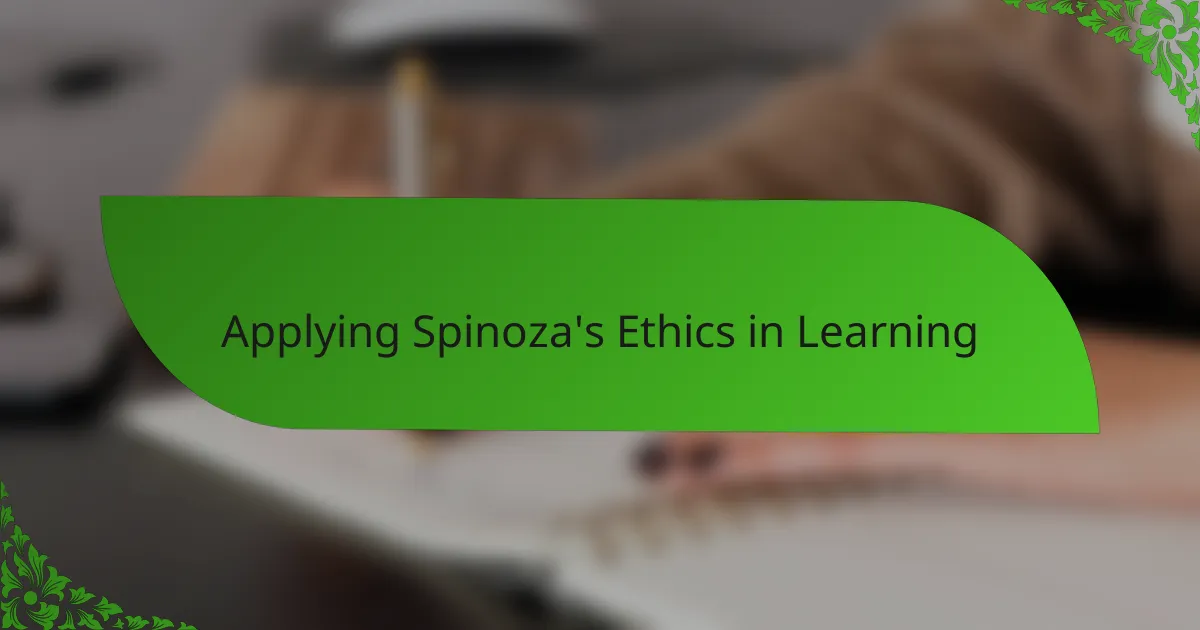
Applying Spinoza’s Ethics in Learning
Applying Spinoza’s Ethics in learning transformed how I approach challenges in my studies. Instead of resisting confusion or frustration, I started seeing these emotions as signs pointing to what I needed to understand better. Have you noticed how shifting perspective on emotions can ease the pressure of learning? For me, it made difficult concepts feel less like obstacles and more like parts of a natural process.
What really resonated was Spinoza’s idea that knowledge brings freedom—a reminder that mastering a topic isn’t just about memorizing facts but about gaining clarity that calms the mind. When I applied this in my own learning, I noticed a change: anxiety faded, replaced by curiosity and confidence. This shift turned study sessions from stressful to empowering experiences.
I also found Spinoza’s emphasis on interconnectedness helpful in collaborative learning. Recognizing that our individual efforts are part of a larger whole helped me stay patient and open during group work. Has working with others ever felt more purposeful when you see how different perspectives contribute to a shared understanding? For me, it’s one of the most practical ways Spinoza’s Ethics comes alive in education.
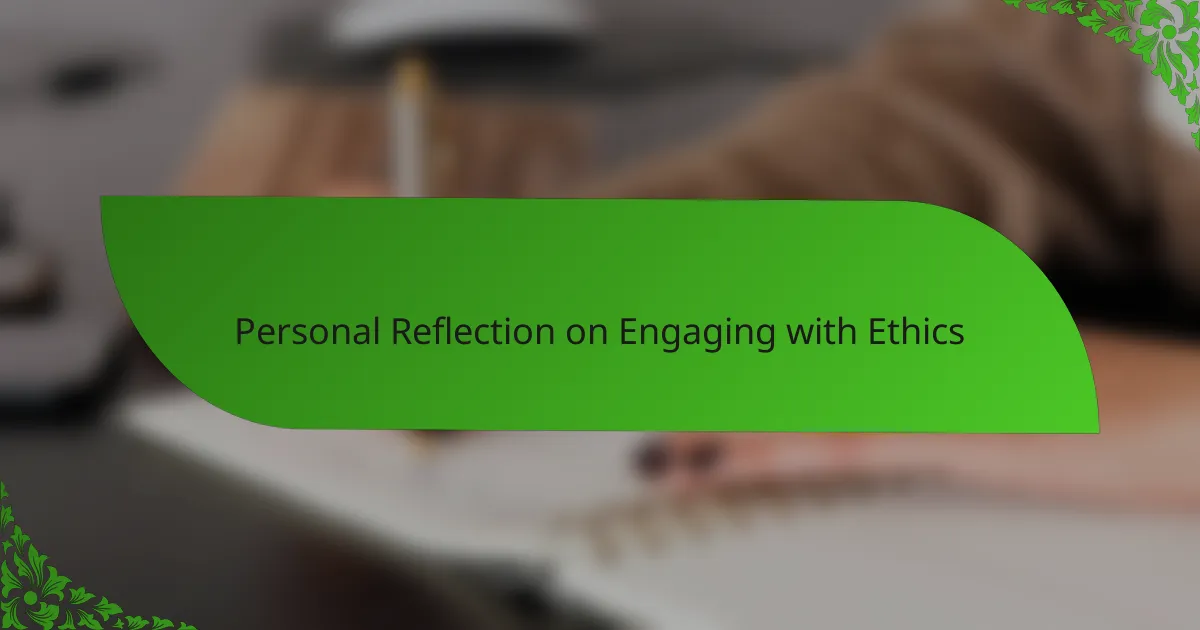
Personal Reflection on Engaging with Ethics
Engaging with Spinoza’s Ethics was, for me, a journey of both intellectual challenge and personal revelation. I often found myself wrestling with his intricate arguments, but each moment of struggle opened a small door to deeper self-awareness. Have you ever encountered a text that not only demands your focus but also subtly shifts how you see your own emotions and choices? That’s exactly what happened as I navigated Spinoza’s ideas on human flourishing.
I remember one particular afternoon when a passage about joy and sadness caught me off guard. Instead of feeling overwhelmed by difficult emotions, I began to see them as signals—clues that I could interpret and use to guide myself towards greater peace. This wasn’t just philosophy on a page; it became a practical tool for self-understanding. How often do we get that chance through academic study?
Reflecting on this experience now, I realize that engaging with Ethics taught me patience—not just with Spinoza’s dense prose, but with the process of learning and living itself. Every step, even the confusing ones, felt like tuning into a deeper rhythm of thought and feeling. Has any philosophical work ever invited you into such a meaningful dialogue with yourself? For me, Spinoza’s Ethics did exactly that, and it’s been a lasting gift in my philosophical education.